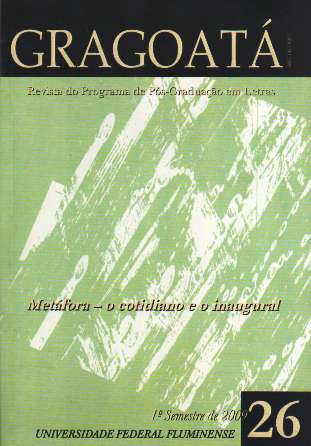O chapéu de Beckett
Palavras-chave:
Beckett. Linguagem. Metáfora. PerspectivismoResumo
Este texto encontra na escrita de Samuel Beckett ocasião para pensar a linguagem, o sentido, a metáfora. Concentra-se na tensão entre o resoluto empenho do escritor em afastar-se de toda linguagem figurada e sua igualmente decidida disposição para a provocação simbólica: seus textos não cessam de convidar a leituras figurativas, ainda que somente para escapulir a elas, frustrá-las, suspendê-las sistematicamente. Não raro, essa estratégia é tomada como sinal de um radical ceticismo linguístico: Beckett estaria evidenciando a ausência de qualquer hors-text, revelando o caráter, em última instância, autorreferente da linguagem. Busca-se aqui uma outra maneira de reclamar o legado do escritor, um ângulo sob o qual a linguagem possa emergir mais radicalmente dissociada da referência, porque afastada até mesmo da autorreferência. Assim orientado, o trabalho enfoca um importante dispositivo beckettiano de provocação simbólica, a saber, a ênfase recorrente dada a certos objetos. Privilegia-se a insistência de Beckett no chapéu. Mostra-se que suas provocações figurativas em torno desse objeto nos dão oportunidade para ver a relação entre as palavras e as coisas, e entre o literal e o metafórico, de uma forma que apresenta afinidades surpreendentes com o perspectivismo, assim como elaborado pelo antropólogo Eduardo Viveiros de Castro, em suas reflexões acerca do pensamento e da vida dos povos ameríndios.
Downloads
Downloads
Publicado
Edição
Seção
Licença
AUTORIZAÇÃO
Autores que publicam em Gragoatá concordam com os seguintes termos:
Os autores mantêm os direitos e cedem à revista o direito à primeira publicação, simultaneamente submetido a uma licença Creative Commons Atribuição 4.0 Internacional (CC BY 4.0), que permite o compartilhamento por terceiros com a devida menção ao autor e à primeira publicação pela Gragoatá.
Os autores podem entrar em acordos contratuais adicionais e separados para a distribuição não exclusiva da versão publicada da obra (por exemplo, postá-la em um repositório institucional ou publicá-la em um livro), com o reconhecimento de sua publicação inicial na Gragoatá.
A Gragoatá utiliza uma Licença Creative Commons - Atribuição CC BY 4.0 Internacional.











